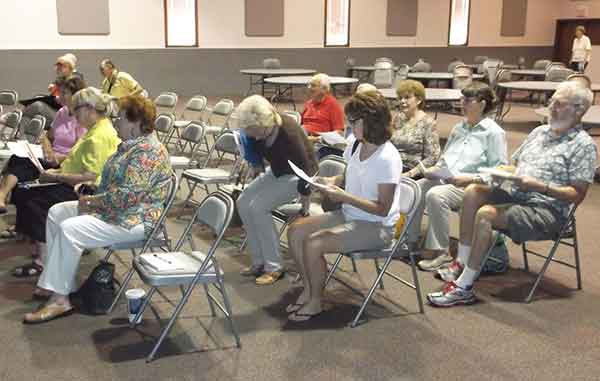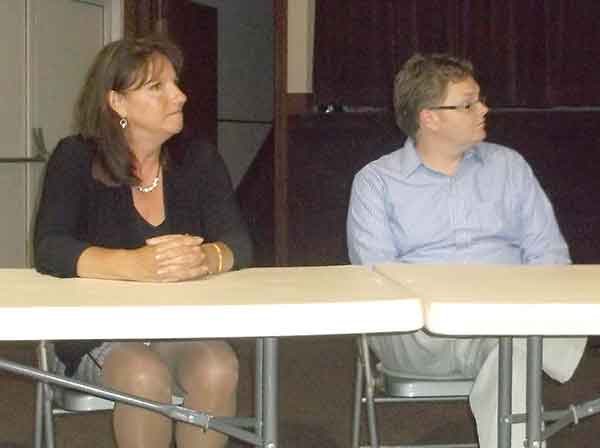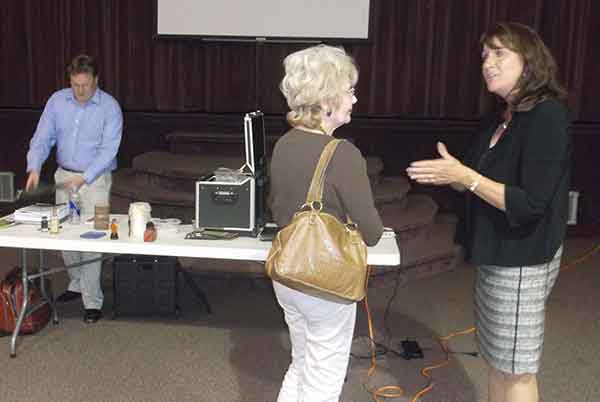|

|
Fracking a
“non-issue” for Darke County
By Bob Robinson
GREENVILLE – “The only impact this process will have on Darke County is
the possibility of lower fuel prices due to the increased availability
of fuel sources.”
That was the basic message of the two speakers June 24 at the
Lighthouse Christian Center.
Entitled “Just the Fracks!” the public information forum was held by
the Darke County League of Women Voters as the other side of the issue
following a public forum conducted earlier that was primarily opposed
to the concept of “fracking.” Speakers were Rhonda Reda, executive
director of the Ohio Oil and Gas Energy Education Program (OOGEEP) and
the Ohio Oil and Gas Energy Foundation Program, and Shawn Bennett,
field director for Energy in Depth Ohio.
“There is no oil or gas exploration in Darke County and there won’t
be,” Reda said. “The geology isn’t right for it.”
She reiterated this several times during her presentation, explaining
that hydraulic fracturing (well stimulation) is occurring primarily in
Eastern Ohio. Injection of the fracturing fluid, brine water, or “slick
water” as it is often termed, another concern of some in Darke County,
takes place close to the well site.
“I would be keeping my costs down,” Reda said. “Putting the water back
into the ground costs money. Transporting it costs even more. Why would
I go to the expense of sending it across the state?
“Besides, all we’re doing is putting the water back where it came from.”
She noted that fracturing fluid is 90 percent water and 9.5 percent
sand. The remaining .5 percent consists of chemicals commonly used in
household items such as sodium chloride (table salt), ethylene glycol
(household cleaner), borate salts (cosmetics), sodium/potassium
carbonate (detergent), guar gum (ice cream) and isopropanol (deodorant).
“This fracturing fluid has safely replaced the dynamite and
nitroglycerin that has been used to stimulate wells in the past.”
Reda addressed the complaint that Ohio was taking “waste” from
Pennsylvania.
“They only have six wells, no infrastructure. We would be in violation
of interstate commerce laws if we didn’t take it and inject it until
they had the structure in place to do it themselves. Again it’s
economics. The injection site is still close to the well site.”
Bennett addressed another complaint that “fracking” is not regulated.
“I don’t know of any industry that is not regulated. We fall under the
Safe Water Act, Clean Water Act, Clean Air Act, OSHA and the Community
‘Right to Know’ Act,” he said. “Ohio has the tightest regulations in
the nation, more stringent than federal regulations.”
He reaffirmed Reda’s comments by noting that while some exploration to
the west (Central Ohio) had been tried it was not getting the results
the companies wanted. At the far east, the concentration was typically
dry gas; useful but not heavily sought after yet. Down the middle of
the Utica Shale is where they are finding the desired wet gas.
“This is where the activity is,” he added. He also noted the economic
impact on the top ten permitted counties.
“Unemployment is down from 2011; sales tax receipts increased in double
digits, up 10 to 25 percent. Dollars are going back into the counties.”
He added that dollars are also going back into farms, helping a lot of
farmers keep their family farms.
A question about property rights brought up knowing what you may or may
not be purchasing.
“If there is one thing you take from this meeting, it’s to know about
what rights you own when you buy land,” Reda said. “You could own a
piece of property, but not know there’s someone else who owns the
mineral rights on your land.”
Attendance was light, 19 individuals including LWV members, as a
Greenville Levy Townhall meeting had been scheduled for the same
evening.
That didn’t however keep some brief fireworks from occurring.
“With 60 years of data, and 30 studies pertinent to Ohio, not a single
case was found to ever cause groundwater contamination…”
“Oh come on, come on!!” The interruption came from LWV member Ann Vehry
in the audience. “I’ve got this book, I didn’t bring it with me…”
“These are well-respected studies…”
The interruptions continued with the two parties speaking over each
other. After other LWV members returned the meeting to the speaker,
Reda reiterated no groundwater contamination from well sites, but added
there were cases in which accidents had occurred during construction.
Following the meeting Vehry apologized, noting that this was a subject
about which she was passionate.
In explaining the role of OOGEEP, one of the areas Reda mentioned was
fire training.
“Are accidents common? No. Do they happen? Yes, just like any other
industry. Want to know what our number one emergency is now?
“Intentional vandalism.”
Reda illustrated the misinformation that was continually provided with
a question… she listed off a half dozen damaging and potentially
dangerous qualities of dihydrogen monoxide then asked if it should be
banned. Out of 150 respondents 143 said yes, six didn’t know…
And one knew she was talking about water.
Published courtesy
of The Early Bird
|

|

|

|
|
|
|

